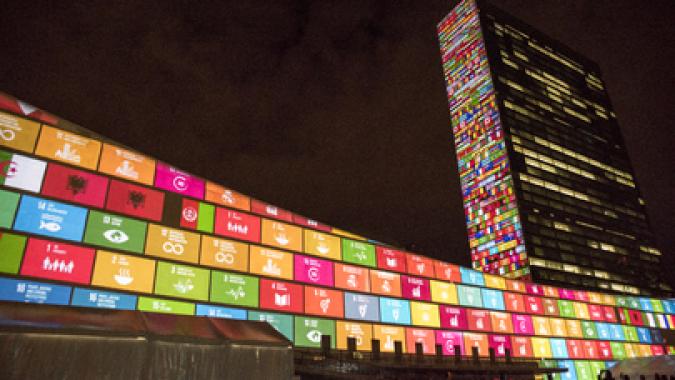Latin America and the Caribbean in the High-Level Political Forum on Sustainable Development
Integrated by the Member States of the United Nations, the High-Level Political Forum on Sustainable Development (HLPF) was created as the central intergovernmental forum for the global monitoring and review of the 2030 Agenda and its 17 Sustainable Development Goals (SDGs). It replaces the United Nations Commission on Sustainable Development and provides political leadership, guidance and recommendations for the implementation, review and monitoring of this agenda.
Since its first session in 2013, the HLPF convenes state ministers every year under the auspices of the United Nations Economic and Social Council (ECOSOC) and brings together Heads of State every four years under the auspices of the General Assembly to promote sustainable development. Each year includes a series of parallel events and exchanges that motivate multi-stakeholder alliances to showcase their work and create innovative solutions. The year 2019 is of particular relevance for the monitoring and review of the 2030 Agenda and its SDGs, since both the HLPF under the auspices of ECOSOC and the SDG Summit under the auspices of the General Assembly will take place, the latter bringing together the Heads of State to discuss the progress and challenges faced in the implementation of the 2030 Agenda.

|
Year |
|||||||||||
|
Theme |
Achieving the MDGs and charting the way for an ambitious post-2015 development agenda, including the SDGs |
Strengthening integration, implementation and review – the HLPF after 2015. |
Ensuring that no one is left behind. |
Eradicating poverty and promoting prosperity in a changing world. |
Transformation towards sustainable and resilient societies. |
Empowering people and ensuring inclusiveness and equality. |
Accelerated action and transformative pathways: |
Sustainable and resilient recovery from the COVID-19 |
Building back better from the coronavirus disease (COVID-19) while advancing the full implementation of the 2030 Agenda for Sustainable Development. |
Accelerating the recovery from the coronavirus disease (COVID-19) and the full implementation of the 2030 Agenda for Sustainable Development at all levels. |
|
|
Result |
The HLPF 2016 resulted in a Ministerial Declaration. ECOSOC in turn issued an event report. |
The HLPF 2017 resulted in a Ministerial Declaration. ECOSOC in turn issued an event report. |
The HLPF 2018 resulted in a Ministerial Declaration. |
The HLPF 2019 resulted in a President Summary. |
The HLPF 2020 resulted in a President Summary. |
The HLPF 2021 resulted in a President Summary and a Ministerial Declaration |
The HLPF 2022 resulted in a President Summary and a Ministerial Declaration |
The HLPF 2023 resulted in a President Summary. |
|||
|
Participation ECLAC |
Presentation of the document "The United Nations regional commissions and the post-2015 development agenda: Moving to deliver on a transformative and ambitious agenda";during the dialogue of the Executive Secretaries |
Presentation by the Executive Secretary in the Plenary |
Presentation by the Executive Secretary in the Plenary |
Presentation of ECLAC’s Executive Secretary;during |
Participation of ECLAC´s Executive Secretary in the |
Presentation by the Acting Executive Secretary in the plenary sessions “Messages from the Regions” and “Mobilizing and sharing science, technology and innovation for an SDG driven recovery”. |
Presentation by the Deputy Executive Secretary in the plenary session “Messages from the Regions” |
||||
|
Number of Voluntary National Reports from Latin America and the Caribbean |
NA |
NA |
NA |
3 |
11 |
8 |
4 |
9 |
11 |
7 |
4 |
|
Announcement |
Under the auspices of the General Assembly |
Under the auspices of ECOSOC |
Under the auspices of ECOSOC |
Under the auspices of ECOSOC |
Under the auspices of ECOSOC |
Under the auspices of ECOSOC |
Under the auspices of ECOSOC |
Under the auspices of ECOSOC |
Under the auspices of ECOSOC |
Under the auspices of ECOSOC |
Under the auspices of ECOSOC |
View Timeline of the High-Level Political Forum on Sustainable Development
The Voluntary National Reviews (VNR)
As part of its monitoring and review mechanisms, the 2030 Agenda encourages member states to conduct periodic and inclusive reviews of progress at the national and subnational levels, which are led by countries. The presentations of these national reviews are an essential part of the HLPF. As specified in the 2030 Agenda, the voluntary national reviews (VNR) presented during the HLPF are led by member states, carried out by both developed and developing countries, and provide a platform for partnerships, including through participation and interaction with major groups and other relevant actors and stakeholders.
The objective of the VNR is then to facilitate the exchange of experiences among peers, including successes, challenges and lessons learned, with a view to accelerating the implementation of the 2030 Agenda. The VNR is also a valuable mechanism to coordinate and strengthen the policies and institutions of governments and mobilize multi-stakeholder support and build partnerships for the implementation of the SDGs.
The VNR in Latin America and the Caribbean
In Latin America and the Caribbean, 28 countries presented their VNR to the HLPF in New York between 2016 and 2021, including 14 countries that submitted their VNR more than once. Consult the map below to find the links to these reports by country.
